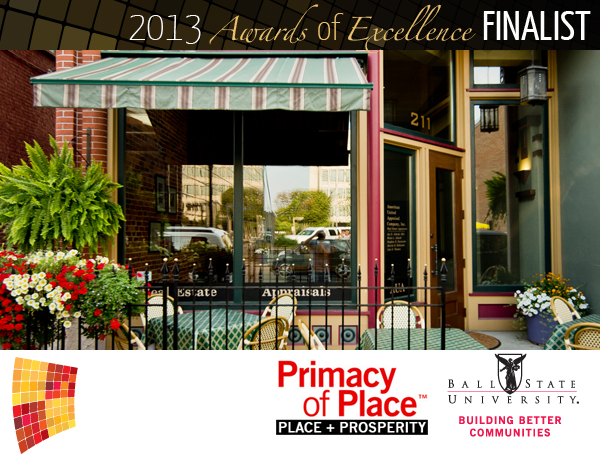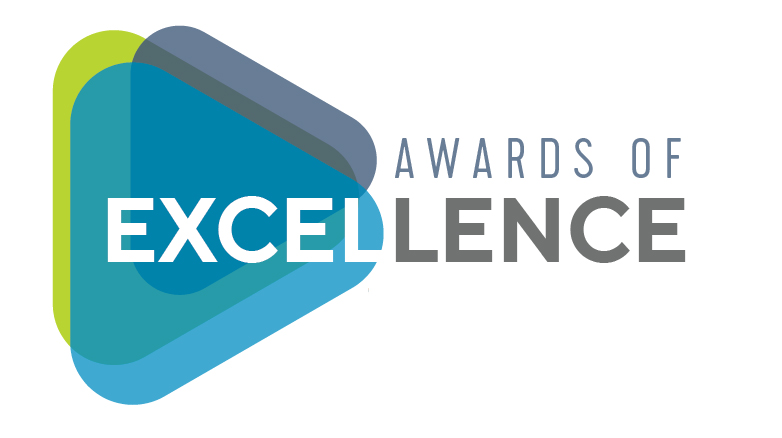Network

| Award Category: | Research and Analysis |
| Project Site: | Building Better Communities at Ball State |
| Submitted By: | Ball State University |
| Contact: | Sarah Browning, 317.840.7475 |
Case Study
Abstract
Ball State University’s Building Better Communities’ (BBC’s) Primacy of Place™Initiative is premised on the idea that a great state is comprised of great communities, and those communities can improve themselves in partnership with Ball State University. BBC has provided comprehensive services that take place in or for the benefit of community partners throughout the state of Indiana. These partnerships serve to engage university faculty, staff, and students in addressing a wide range of community challenges.
Primacy of Place™ represents a community’s strategic choice to dedicate its resources toward placemaking and the improvement of life experiences for residents, businesses, and visitors. Today, the most successful communities are those that recognize the critical importance of human capital in order to compete effectively for economic development. Talent is the single most important element in local economic development, and we believe quality of place is the primary factor in a community’s ability to attract and retain talent.
The ongoing activities of the Primacy of Place™Initiative include a community awards program to recognize successful community quality of place initiatives, a conference to bring together business, university, and civic leaders to discuss how quality of place contributes to economic prosperity, knowledge groups to identify intellectual and creative resources related to Primacy of Place‰ã¢, and best practice databases to make resources readily available.
Problem/Background
For more than 25 years, BBC has provided comprehensive services that take place in or for the benefit of community partners throughout the state of Indiana. In addition to the privilege we enjoy from working with communities across the state, we are also exposed to multiple approaches. This has granted us the ability to learn which kinds of strategies are most likely to produce tangible economic improvement at the community level.
In this process, we have discovered that the most prosperous communities today are those that can successfully develop, retain, and attract talented people who choose to live in the community. This proposition is supported by ample research, current literature, and observation throughout the U.S. From this work and associated research, we have concluded that the level of talent present within a community is the single most important indicator of economic performance, measured by a number of means that include job growth, but not solely. Income growth, population growth, retail sales, average age and educational level of the population, for instance, provide a more comprehensive, and hence more valid measure of a community’s economic performance.
Upon identifying this need, Building Better Communities has engaged with thought leaders across the university as well as government and business leaders to develop a wide range of innovative and accessible tools, resources, and educational offerings for communities. The Primacy of Place™ Initiative is designed to provide communities with tools and resources to improve their quality of place and therefore their economic prosperity.
Solution
Realizing that university and state resources are limited, BBC has taken the lead role in the development of a comprehensive menu of tools and resources for communities. BBC has partnered with university faculty heads and state leaders for their expertise and insights. The programs and services include:
Primacy of Place™ Community Awards – The Primacy of Place™ Community Awards Program publicly recognizes communities making quality of place their priority because place matters to people and people matter to business. Applications are structured much like UEDA’s award program; focusing evaluation on mostly narrative descriptions of applicant communities’ demonstrated resource commitments to placemaking. Applicants are asked to provide a project description, identify partners, lessons learned, outcomes, longevity, and project data. The evaluation team consists of three members: two from Ball State University’s Building Better Communities unit and the Deputy Director of the Indiana Office of Community and Rural Affairs. Award ceremonies are scheduled for August 8, in Indianapolis. Original glass artworks are commissioned for the awards from Ball State’s College of Fine Arts. Twenty-two communities – some with decades of material commitment to placemaking – applied for the awards.
Primacy of Place™ Conference – The Primacy of Place™ Conference scheduled for September 20, 2013 will bring together business and civic leaders to share and explore the art of developing, attracting, and retaining talent through quality of place initiatives.
Primacy of Place™ Knowledge Groups – As part of the university’s focus on Primacy of Place™, quality of place, and human capital development, BBC is collaborating on the creation of several extended knowledge groups. “Extended” in this context refers to the membership of both university academics and practitioners within selected disciplines These groups will be a featured element of the Primacy of Place™ Conference in addition to providing intellectual and creative resources for deploying knowledge in Indiana communities. Knowledge groups continue to be formed around the following disciplines for 2013: Arts Integration in Community Economic Development, Community Design, Community Wellness, Municipal Governance, Quality Education, and Community Readiness for Change.
Primacy of Place™ Best Practices Databases – The Primacy of Place™ Best Practices Databases are important elements of the strategy to establish Ball State University as Indiana’s unchallenged thought and practice leader in this realm. The databases, to be hosted on Ball State’s website, will provide an ever-evolving set of information on a variety of categories relevant to Primacy of Place™. Entries include a relative balance of published peer-reviewed works, website links to general resources, YouTube videos, case studies, publicly-available plans, presentations, etc.
The Primacy of Place™ initiative is continually growing. New offerings will be developed as the initiative moves forward and additional needs and opportunities are identified.
Results
- Community Awards Program. Ball State’s announcement of the Primacy of Place™ (“PoP”) Community Awards Program resulted in 21 Indiana communities (incorporated cities and towns) submitting 22 applications for the special recognition of outstanding placemaking activities, programs, and initiatives. Data collected provided detailed descriptions of each community’s program(s), including partnerships in local placemaking, funding strategies, sustainability of the initiatives, impact, and more. Many communities provided photos, planning documents, funding sources, descriptions of volunteer efforts, etc. In advance of a September 20 PoP Conference, the three “winners’” applications will be posted on Ball State’s PoP website in their entirety as a best practices database. Every applicant community’s work will be summarized on the site and highlighted at the conference.
Statewide media coverage of the program highlighted the importance of quality of place as it relates to local and regional economic performance, and raised state economic development leaders’ awareness of and knowledge about the practice and its connection to economic performance.
Ball State’s announcement and execution of the initiative also facilitated the university’s recognition as the state’s leader, convener, and statewide resource base for expertise, collaboration, learning, and scholarship on placemaking as it relates to economic development.
- The Primacy of Place™ Conference has attracted the interest of a number of nationally-prominent leaders in business, economic development, and placemaking in one location.
- Headquartered in Columbus Indiana, Fortune 200 company Cummins, Inc.’s, CEO Thomas Linebarger will address the attendees about the firm’s challenges and the activities in which it engages to compete for the talent it needs to maintain its global leadership position in diesel technology, power generation, and other heavy industry subsectors.
- Fred Kent, founder of Project for Public Spaces, agreed to speak at the conference at Ball State’s request for a presenter. Initially, we were told “someone” would speak at the conference. After reviewing the topic, the university, and other presenters, he chose himself to speak in this venue.
- Orthoworx’s (an orthopedics-based cluster support organization) CEO Sheryl Conley will address attendees about the opportunities and threats that face Indiana’s only “cluster” as identified by Harvard University’s Dr. Michael Porter in his seminal work on the subject. Clustered in and immediately around Warsaw, Indiana – a county seat with a population under of 15,000 in a county of less than 80,000. Ms. Conley will address the opportunities and risks associated with the high-tech cluster’s ability to attract and retain talent in a non-metropolitan rural Midwestern community.
- Indiana’s Lieutenant Governor Sue Ellspermann, whose agency responsibilities include oversight of the Indiana Offices of Community and Rural Affairs, Tourism Development, Agriculture, and Housing and Community Development. Five years ago, Dr. Ellspermann was a faculty member with outreach and engagement leadership responsibilities at the University of Southern Indiana, a unit with which Ball State collaborated on a number of meaningful place-based projects. Her presence at the conference speaks to her trust in Ball State’s leadership on this topic and its importance to Indiana.
- Other speakers include Ball State’s President Jo Ann Gora, Provost Terry King, and Inside Indiana Business’s (a statewide daily business and public affairs news feed) Gerry Dick, a well-known source of matters of import to Indiana.
- Ball State’s ability to attract this level of talent and leadership results directly from the university’s credibility in economic development and their embrace of the topic as a cornerstone of economic development today.
- PoP Best Practices Databases have resulted in the direct engagement of six Best Practices Database leaders, aka Primacy of Place™ Fellows. These leaders have recruited another 10-15 faculty members to participate in the project. As structured, these “Knowledge Groups”, a Ball State designation of an informal but recognized research collaborative, resulted in the inclusion of 20-25 non-university personnel who have agreed to partner with Ball State on the creation, maintenance, and population of the databases. The resultant private sector partnerships and engagement materially improves knowledge creation through the inclusion of practices in the field, and improves knowledge dissemination through the partners’ established communication networks.
At least one knowledge group has already applied to become a Knowledge Unit, seeking the official designation that facilitates university allocation of financial and non-financial resources to the endeavor.
Future Considerations
The Primacy of Place™ initiative is aligned with Ball State University’s five year strategic plan with the goal of advancing Indiana through student engagement and faculty expertise. This is accomplished by leveraging university expertise to increase the competitiveness of Indiana’s communities and businesses. This connection to the university strategic plan has allowed BBC to better enlist and engage faculty support and involvement.
BBC is striving to work harder but also smarter. The intent of the knowledge groups and the best practice databases is not to create additional work for faculty, but rather better highlight the impactful and useful work the university is already doing by making it readily available for communities. This approach of providing outreach and assistance by connecting with the institution’s overall mission and strategic plan could easily be replicated by both large and small institutions.
The Primacy of Place™ Initiative has been successful in creating partners to ensure its sustainability. These partners have given both time and resources. The Indiana Office of Community and Rural Affairs has provided funding for the Primacy of Place™ Community Awards Program and sponsors have been identified for the Primacy of Place™ Conference. Communities will pay for additional services provided to support the initiative. BBC will continue to devote staff time to the on-going maintenance and updating of the best practice databases to ensure they remain up-to-date and relevant. Additional sponsors and partners will be enlisted as needed.
Finalist Presentation
UEDA Awards of Excellence Finalists presented at the Annual Summit in Pittsburgh on October 28, 2013. Summit attendees then voted for the best initiative in each category.

